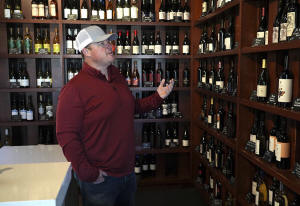California's wine industry leery of tariffs, but some growers hope they
help
[March 20, 2025] By
TERRY CHEA and AMY TAXIN
LODI, Calif. (AP) — Escalating trade tensions between the U.S. and
Europe are being closely watched in California’s iconic wine industry,
which is already struggling due to declining global wine consumption,
rising costs and swings in weather.
Many fear tariffs will hike the costs of wine-making materials and
dampen U.S. importers of European wines. The Wine Institute, which
advocates for California wineries, said the tariffs will "hurt the
broader wine sector including farmers, vintners, distributors, retailers
and the millions of people working across the extended wine supply
chain.”
But some winegrape growers in the Golden State are hoping for a silver
lining.
Four-decade winegrape grower Craig Ledbetter said it costs more for him
to farm in California than it would in wine-producing countries like
Chile and Australia, and his industry doesn’t get the government support
European grapegrowers do. A partner at family-operated Vino Farms in
Lodi, Calif., Ledbetter said he left thousands of tons of winegrapes on
the vine two years ago due to paltry demand and has shifted some land
into more lucrative pistachios.
He said he sees President Donald Trump’ s call for a 200% tariff on
European wine, Champagne and spirits as a starting point, not an end to
negotiations, and hopes in the long-run that tariffs will improve his
lot.
“I think it’s all going to work itself out, and I think it will equal
our playing field a little bit,” he said. “As a farmer I have to look at
it through an optimistic lens, because if I don’t, you know, what am I
doing?”
Many wine advocates and experts have warned that tariffs are expected to
hurt U.S.-based importers and increase the cost of supplies such as wine
barrels and glass bottles. They say Trump's latest move — in response to
European plans for a 50% tariff on American whiskey — could draw
retaliatory tariffs that would wallop U.S. exports of wine to Europe.

Already, U.S. wine is facing a 25% import tax in Canada — the
destination for a third of California's wine exports in 2022 — since the
Trump administration slapped tariffs on a series of Canadian goods.
Jessie Vallery, director of marketing and operations for Alexander
Valley Winegrowers in Sonoma County, said Canada has already pulled U.S.
wines from the market.
California produces about 80% of U.S. wine and shipped about 24 million
cases of wine overseas in 2023, according to Wine Institute figures.
[to top of second column] |

Craig Ledbetter of Vino Farms looks at locally made wines at the
Lodi Wine Visitor Center in Lodi, Calif. on March 18, 2025. (AP
Photo/Terry Chea)
 The state's wine industry is already
under tremendous pressure due to shifting consumption patterns as
well as rising farming costs, wildfire smoke exposure and drought.
The total amount of wine consumed per capita in the United States in
2023 was the lowest in more than a decade, according to the Wine
Institute.
Most California wine is consumed in the United States. But wine
exports are a key agricultural commodity for the state. Valued at
$1.3 billion in 2022, wine exports trail only almonds, dairy and
pistachios, state data show.
Mainstream economists are generally skeptical about tariffs,
considering them an inefficient way for governments to raise
revenue.
Stuart Spencer, executive director of the Lodi Winegrape Commission,
said tariff talk bogged down his recent trip to Europe to promote
California wines.
Wine is especially vulnerable to trade wars because location matters
as wine is marketed based on the region where grapes are grown and
is not an interchangeable good, he said.
“It has created a lot of chaos and uncertainty,” he said, adding
European buyers worried there could be retaliatory tariffs driving
up the cost of U.S. wine. "It has created a lot of hesitancy, which
is leading to cancelled sales.”
But in the short term, higher tariffs on European wines might make
California wines relatively more affordable and create some new
opportunities, said Rob McMillan, executive vice president and wine
division founder at Silicon Valley Bank.
Keith Saarloos said he doesn't export wine from his estate vineyard
in Santa Barbara wine country, and only sells direct to consumers
“from our plow to your porch.”
He said the tariffs are just another bump during a tumultuous time
in an industry he likened to offroading, and he hopes something good
comes from it.
“I would love every single person to focus all their attention on
new wines,” Saarloos said. “I have to remain optimistic.”
___
Taxin reported from Santa Ana, California
All contents © copyright 2025 Associated Press. All rights reserved |